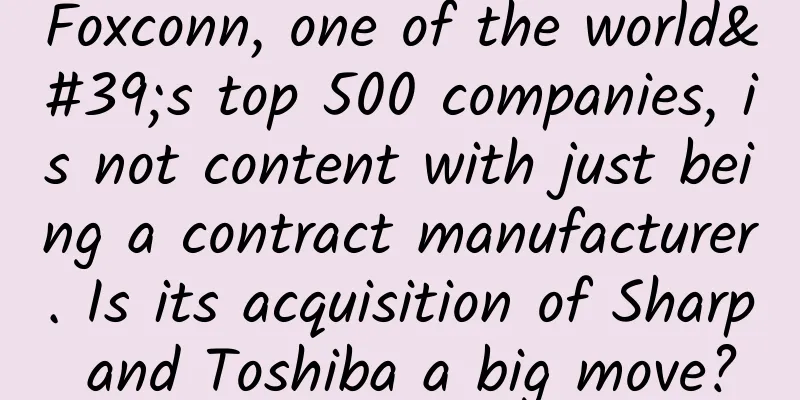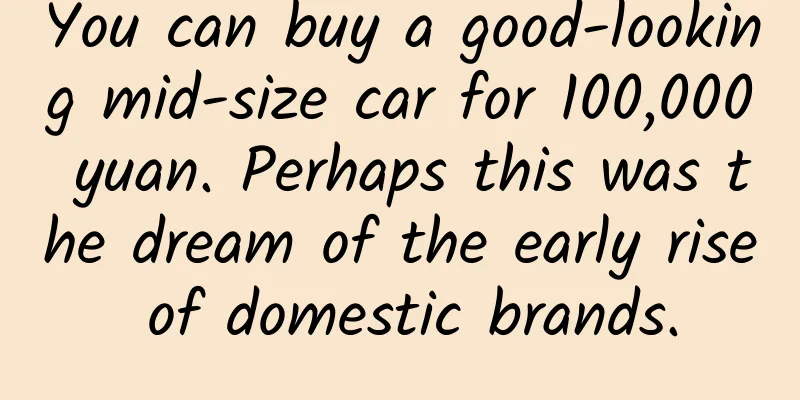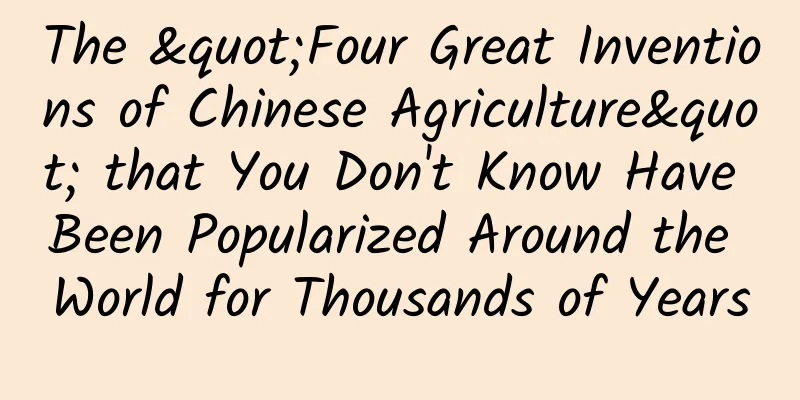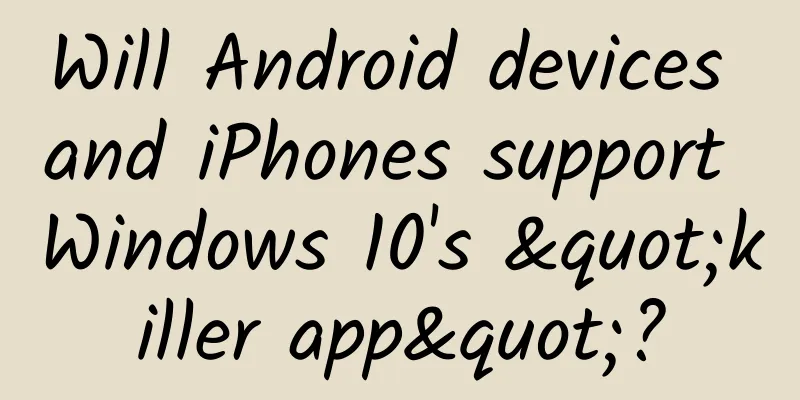Foxconn, one of the world's top 500 companies, is not content with just being a contract manufacturer. Is its acquisition of Sharp and Toshiba a big move?

|
Since Foxconn acquired Sharp, Sharp has undergone tremendous changes. According to the latest news from foreign media, in the last fiscal year ending at the end of March, Sharp's losses will be greatly reduced, reflecting the great effect of Foxconn's integration. On April 25, it was reported that in the last fiscal year ending March 31, Sharp's loss was approximately 25 billion yen, equivalent to 227 million US dollars, which was lower than Foxconn Group's previous expectations.It is reported that Sharp originally estimated a loss of 27.1 billion yen, and compared with the loss of 255.9 billion yen in 2015, Sharp's performance has improved significantly. Comparing the data, it can be found that Sharp's loss will be only one-tenth of that in fiscal 2015. Foxconn brings Sharp back to life This year's performance fully demonstrates that Foxconn Group's restructuring and adjustment of Sharp has produced direct results. Since Dai Zhengwu, the second-in-command of Foxconn Group, became the CEO of Sharp last year, he began to implement the restructuring plan. Foxconn has also introduced a stricter assessment mechanism to improve the efficiency of corporate operations. Foxconn has begun to revive Sharp's TV and LCD panel business. According to the plan, Sharp's TV production will double. At the end of last year, Foxconn, Sharp and the Guangzhou Municipal Government cooperated to build an LCD panel factory in Guangzhou. In addition, in Pennsylvania, Sharp also plans to build an LCD panel factory, mainly for the production of TVs. Sharp has also begun to sell smartphones again in the Chinese market. It is said that Foxconn Group has begun to integrate the mobile phone businesses of Sharp, Nokia and others, and conduct unified marketing and coordination. Not only that, it is reported that Foxconn Group has also actively helped Sharp sell home appliances, and once held a Sharp home appliance exhibition within the group to encourage employees to buy. Not long ago, Sharp's head, Dai Zhengwu, said that Sharp is ready to return to the IT equipment market, including personal computers, which will be produced by Foxconn Group and sold under the Sharp brand. Foxconn and Sharp team up to bid for Toshiba After Foxconn revived Sharp, it also showed strong interest in another Japanese company. Currently, Toshiba is preparing to transfer its flash memory business to other companies. Foxconn, a Chinese electronics OEM giant, is eager to acquire this asset. After offering a price higher than the seller's expectations, according to foreign media reports, Foxconn is ready to let Sharp join the bidding consortium to increase the chances of winning the deal. Foxconn Group previously spent $3.5 billion to acquire two-thirds of Sharp's shares, but Sharp still maintains independent operations, and Foxconn still needs to negotiate before it can invite Sharp to join the bidding transaction. It is reported that Foxconn Group allowed Sharp to join the bidding consortium, probably hoping to provide assistance in transaction review and other aspects, and to make the transaction negotiations with Toshiba smoother. Previously, Foxconn Group's head Terry Gou also said that Toshiba does not need to worry about the outflow of key technologies. If Foxconn Group acquires it, Toshiba can keep its semiconductor technology in Japan. At present, the first round of bids for Toshiba's flash memory business transfer has ended, and Foxconn Group is very likely to be shortlisted for the next round. It is reported that its first round bid was as high as 3 trillion yen. In the past, Toshiba executives publicly stated that the highest valuation for the flash memory business was 18 billion US dollars, and Foxconn's bid has far exceeded the upper limit of the valuation, so its competitiveness can be imagined. Foxconn is not content with manufacturing It seems that many people became familiar with Foxconn because of the employee suicide incident, but the successive mergers and acquisitions have made people re-recognize Foxconn's strength. Unlike pure Internet technology companies such as Google, Foxconn, which was born in the manufacturing industry, rarely focuses on future black technology fields such as genetic life and space exploration, which are difficult to see results in the short term but can affect the human social ecology. The steady and pragmatic manufacturing gene makes Foxconn more inclined to some fields that can quickly realize profits and have higher return on investment or capital turnover rates. While Foxconn has rapidly risen with the help of Apple's OEM production, it naturally realizes the problems of low OEM profit margins and strong dependence on a single customer, and has been seeking transformation. Foxconn, which started out as a manufacturer but is not content with just manufacturing, has gradually grown into a platform-based enterprise. Of course, this huge aircraft carrier is actually the Hon Hai Group behind Foxconn, and partners such as Alibaba have allowed Foxconn to gradually move out of the B-end business enterprise market and gradually penetrate the C-end personal consumer market. While the entire enterprise is constantly moving towards platformization, its product areas are also constantly expanding. In addition to the familiar mobile phones and TVs, Foxconn is also involved in the research and development and manufacturing of related products in many fields such as robot manufacturing, e-commerce, sensors, and smart driving. All mergers and acquisitions are only part of Foxconn's ambitions Foxconn Group is getting rid of its reliance on Apple's foundry business and building a stronger parts business. The acquisition of Sharp and Toshiba is just a part of Foxconn's industrial chain. The previous acquisition of Sharp was based on Sharp's excellent LCD panel technology, while the acquisition of Toshiba means that Foxconn wants to take this opportunity to enter the flash memory business in a big way. If Foxconn takes over Toshiba's flash memory business, it can obtain lower raw material procurement costs for its mobile phones, smart TVs and other terminal equipment that require flash memory chips. In this way, not only can Hon Hai gradually get rid of its dependence on Apple's foundry business, but it can also further compete with its old rival Samsung. Currently, Samsung is the world's largest memory chip company, and Toshiba is the second largest memory chip company. If Hon Hai can successfully acquire Toshiba, it will undoubtedly further intensify its competitive relationship with Samsung. Samsung has more than 40% of the global memory chip market share, while Toshiba, which ranks second in market share, has a memory chip technology advantage. It is currently developing a new generation of 64-layer 3D flash memory chips, which will increase storage capacity by 30%. If Hon Hai can obtain financial support from Hon Hai, it is expected to speed up mass production, which is exactly what Hon Hai hopes. Foxconn's ambitions do not stop there. After acquiring Sharp and Toshiba, which may be acquired, it is very likely to have its own brand and become the next giant. Currently, most mobile phone manufacturers do not have any core technology and rely on assembling machines. For this reason, if Foxconn can perfectly combine Sharp's panel technology and Toshiba's chips, a new mobile phone brand may be born. This conjecture is not without basis. Never forget that Foxconn was formerly Hon Hai, which was just a small factory. Hon Hai's real rise was when it began to take orders for Dell computers. Foxconn's real strength lies in its supply chain technology capabilities, which it has accumulated for more than half a century. Foxconn has filed lawsuits in mainland China several times because its senior executives took important supply chain knowledge to new companies after leaving. Therefore, with strong supply chain support, Foxconn is not without opportunities. In addition, Foxconn's patented technology is also the key to becoming the next giant. Foxconn has applied for 128,400 patents and has been granted more than 64,300 patents. Most people think that Foxconn relies on bargaining to grab orders, but they never know that Terry Gou really relies on patent barriers to maintain his empire. The best example is the connector on the computer motherboard. That little thing, most of the patents in the world are in the hands of Foxconn's parent company Hon Hai. Logically, ordinary computer manufacturers will be dragged into litigation by Terry Gou if they do not give orders to him. Terry Gou has said many times that he has only three weapons to maintain his empire: the supply chain, patents, and his dream, the Industrial Bank. Therefore, to sum up, no matter which aspect Foxconn focuses on developing in the future after getting rid of the OEM hat, it may become the next giant in the technology industry. As a winner of Toutiao's Qingyun Plan and Baijiahao's Bai+ Plan, the 2019 Baidu Digital Author of the Year, the Baijiahao's Most Popular Author in the Technology Field, the 2019 Sogou Technology and Culture Author, and the 2021 Baijiahao Quarterly Influential Creator, he has won many awards, including the 2013 Sohu Best Industry Media Person, the 2015 China New Media Entrepreneurship Competition Beijing Third Place, the 2015 Guangmang Experience Award, the 2015 China New Media Entrepreneurship Competition Finals Third Place, and the 2018 Baidu Dynamic Annual Powerful Celebrity. |
<<: JAC and Volkswagen jointly built cars but lost the VW logo. Would you buy such a Volkswagen?
>>: Dedicated to young people who love sports, the new generation of Focus may be launched this year
Recommend
Suddenly, WeChat and Alipay can no longer deposit money
Recently, Alipay has taken down bank deposit prod...
HTC's failure to adapt to local conditions and its fatal shortcomings
HTC was once the king of the Android camp. In Apr...
Tips to make Tik Tok videos popular, how to make short videos popular?
Tips to make Tik Tok videos popular, how to make ...
Red umbrellas and white stems, how did the ancients eat mushrooms?
If you are a web surfing enthusiast, you must hav...
How to take a “natural photo” of the earth?
Author: Wang Su (Institute of Atmospheric Physics...
The most complete salon event planning summary in history!
Introduction: For operations personnel, the work ...
Seeing this WeChat update, I decided to praise the founder
[[411358]] I believe that friends who have checke...
Kunshan Social Insurance Fund Management Center: National Internet Security Management Service Platform!
In order to protect network information security,...
Comprehensive improvements! Detailed experience of the latest WeChat version features
WeChat has been very active recently and has been...
How to build a SaaS product from 0 to 1
For a SaaS product, it is very important to build...
The sauna at Xi'an Men's SPA Tea Club is very unique and you must go there once
All technicians are trained by specially hired fa...
Pilates Li Xin Pilates Control
: : : : : : : : : : : : : : : : : : : : : : : : : ...
Stop cleaning up "zombie fans" WeChat official: This is a scam and is extremely harmful
You may have hundreds or even thousands of WeChat...
Is it worth upgrading old devices to iOS 8? Security should not be ignored
According to the New York Times, iOS 8 has been o...
ThinkPad's classic red dot design: destined to be eliminated by the times!
When it comes to business notebooks, every manufa...









